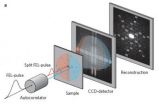(Press-News.org) The team found that a bacterium inside the worm acts as a 'disguise' for the parasite, resulting in the immune system reacting to it in an ineffective way. The bacteria protect the worm from the body's natural defences, but once the bacteria are removed with antibiotics, the immune system responds appropriately, releasing cells, called eosinophils, that kill the worm.
Antibiotics are successful against the parasite, but the long treatment regime means that it has limited use across whole communities. These new findings suggest that if medics could prime the immune system to recognise the worm, a shorter duration of antibiotic treatment may be sufficient to overcome its bacterial defences.
River Blindness is caused by black flies that breed in rivers and deposit the larvae of a worm into the person they bite. The infection leads to severe itching of the skin and lesions of the eye which can result in blindness. It affects millions of people in developing countries, particularly in West and Central Africa. A closely related parasite also infects cattle, which causes lumps to appear on the animal's skin but does not cause blindness or other illness.
Dr Ben Makepeace, from the University's Institute of Infection and Global Health, explains: "Our team has already shown that removing the bacteria with antibiotics results in the death of the worm, but until now we were unaware of how the bacteria protected the parasite in the first instance. Antibiotics can rid the parasite of the bacteria, allowing the immune system to respond properly, but it is a long treatment process, lasting up to six weeks.
"Now we can begin to look for a way to 'prime' the body into reacting to the parasite more efficiently. Currently there is no vaccine for River Blindness, but if a candidate could be identified this may help boost the immune system ahead of antibiotic treatment and reduce the length of time patients have to take the drug. It is essential that whole communities are cured of the infection and the more we know about the mechanisms the parasite uses to survive in the body, the further we can progress with finding a practical treatment that kills adults worms and not just the larval stages"
INFORMATION:
The research is funded by the Biotechnology and Biological Sciences Research Council (BBSRC), Pfizer Animal Health, and the European Commission. It is published in Proceedings of the Royal Society B.
Notes to editors:
1. The University of Liverpool is a member of the Russell Group of leading research-intensive institutions in the UK. It attracts collaborative and contract research commissions from a wide range of national and international organisations valued at more than £110 million annually.
Study sheds new light on river blindness parasite
2011-01-13
ELSE PRESS RELEASES FROM THIS DATE:
Sleep mode: The energy cost of sleep deprivation
2011-01-13
The findings show that missing a night of sleep burns roughly 135 calories, the equivalent of two slices of bread or a 225 ml glass of semi-skimmed milk. In terms of physical exertion, this amounts to walking just under two miles. On the flip side, eight hours of sleep saved the same approximate amount of energy.
'While the amount of energy saved during sleep may seem small, it was actually more than we expected,' says Professor Kenneth Wright, lead author of the study and Director of Colorado University's Sleep and Chronobiology Laboratory. 'If one considers the amount ...
The 'Spaser' heats up laser technology
2011-01-13
Lasers have revolutionized the communications and medical industries. They focus light to zap tumors and send digital TV signals and telephone communications around the world.
But the physical length of an ordinary laser cannot be less than one half of the wavelength of its light, which limits its application in many industries. Now the Spaser, a new invention developed in part by Tel Aviv University, can be as small as needed to fuel nano-technologies of the future.
Prof. David Bergman of Tel Aviv University's Department of Physics and Astronomy developed and patented ...
Adrenaline receptor 'frozen in action' by VIB researchers
2011-01-13
Brussels - Adrenaline, the hormone that prepares our body to fight or flight, acts on a hyperdynamic receptor. This molecule switches so fast between several positions, that it was impossible to image it. Until now. Scientists, including Jan Steyaert of VIB and the Vrije Universiteit Brussel in Belgium, and colleagues from Stanford University in the US, have "frozen the molecule in action" using Xaperones™, tiny, stable antibodies developed by the Brussels scientists. The Xaperones™ bind like a key to a lock, holding the adrenaline receptor in one position -- the on position. ...
Origins of the pandemic: Study reveals lessons of H1N1
2011-01-13
As H1N1 'Swine Flu' returns to the national headlines a new research paper reveals the key lessons about the origins of the 2009 pandemic. The paper, published today in BioEssays, reveals how the pandemic challenges the traditional understanding of 'antigenic shift' , given that the virus emerged from an existing influenza subtype.
"H1N1 emerged in February 2009 in Mexico and swept around the globe within 6 months." said Professor Hans Dieter Klenk from Philipps-Universität Marburg. "The conventional ideal is that pandemics are fuelled by new strands which emerge in the ...
New approach to modeling power system aims for better monitoring and control of blackouts
2011-01-13
Major power outages are fairly infrequent, but when they happen they can result in billions of dollars in costs – and even contribute to fatalities. Now research from North Carolina State University has led to the development of an approach by which high-resolution power-system measurements, also referred to as Synchrophasors, can be efficiently used to develop reliable models of large power systems, which would help us keep an eye on their health.
Synchrophasors are real-time measurements of voltages and currents that provide a very high-resolution view of various complex ...
People neglect who they really are when predicting their own future happiness
2011-01-13
Humans are notoriously bad at predicting their future happiness. A new study published in Psychological Science, a journal of the Association for Psychological Science, suggests that part of the reason for these mispredictions lies in failing to recognize the key role played by one's own personality when determining future emotional reactions.
The new evidence comes from Jordi Quoidbach, a psychological scientist at the University of Liege, Belgium. Quoidbach and Elizabeth Dunn, his collaborator at the University of British Columbia, found that our natural sunny or negative ...
Fastest movie in the world recorded
2011-01-13
When we catch a cold, the immune system steps in to defend us. This is a well-known biological fact, but is difficult to observe directly. Processes at a molecular level are not only miniscule, they are often extremely fast, and therefore difficult to capture in action. Scientists at Helmholtz-Zentrum Berlin für Materialien und Energie (HZB) and the Technische Uni-versität Berlin (TUB) now present a method that takes us a good step towards producing a "molecular movie". They can record two pictures at such a short time interval that it will soon be possible to observe molecules ...
Sleep-disordered breathing comes at a heavy cost
2011-01-13
"Snoring, sleep apnoea, and obesity-related respiratory difficulties are fairly common disorders that affect a large proportion of the population," according to Poul Jennum, Professor of Clinical Neurophysiology at the Center for Healthy Ageing at the University of Copenhagen Faculty of Health Sciences. He is head of the Danish Centre for Sleep Medicine, Glostrup Hospital, which treats patients from all over the country.
"Previous studies show that these disorders seriously affect quality of life, and our new studies show that people who snore violently, and particularly ...
'Yo-yo' effect of slimming diets explained
2011-01-13
If you want to lose the kilos you've put on over Christmas, you may be interested in knowing that the hormones related to appetite play an important role in your likelihood of regaining weight after dieting. A new study confirms that people with the highest levels of leptin and lowest levels of ghrelin are more likely to put the centimetres they lost back on again.
Doctors often have to deal with patients who, after sticking to a slimming diet, have regained the kilos lost in just a short time – or weigh even more than they did before they started the diet. This is called ...
Drug reduces the increase in fear caused by previous traumatic experiences in mice
2011-01-13
Mice previously exposed to traumatic situations demonstrate a more persistent memory of fear conditioning - acquired by associating an acoustic stimulus with an aversive stimulus - and lack the ability to inhibit this fear. This phenomenon is similar to that of people who suffer from Post-Traumatic Stress Disorder (PTSD), an anxiety disorder which appears after being exposed to highly traumatic situations, such as a violent attack, a natural disaster or physical abuse.
In the study researchers verified that the 7,8-Dihydroxyflavone injected into mice previously subjected ...

